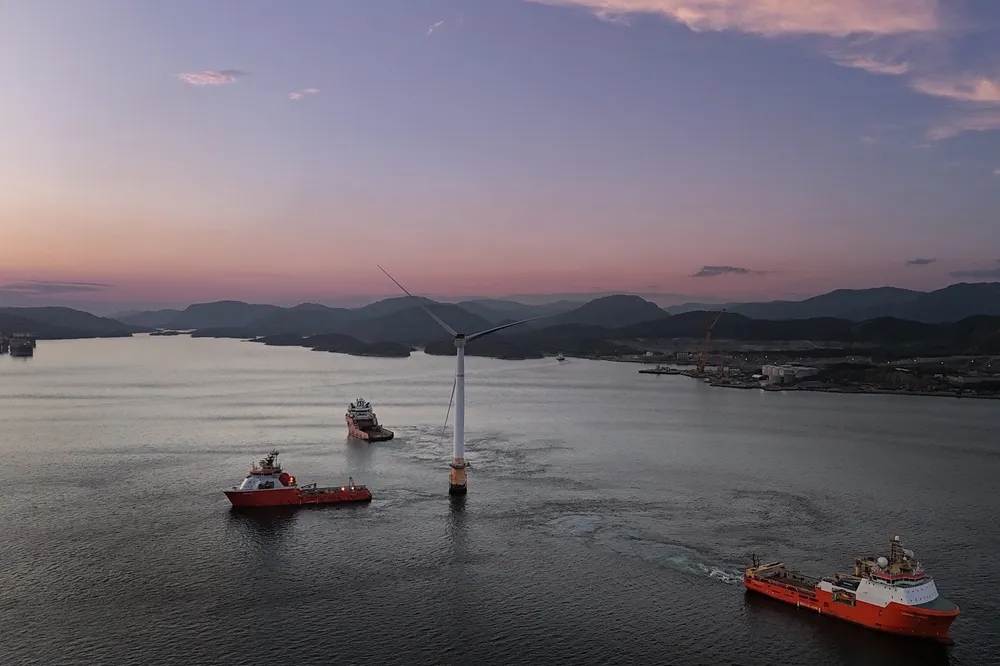Masdar's offshore wind chief names key markets and warns governments must step up
Husain Al Meer sees growth prospects in Europe and beyond for the UAE's green giant but has a policy wish-list too

Masdar’s global offshore wind chief had a warning for governments as he set out a list of markets potentially set to see investment by the deep-pocketed UAE renewables developer.
Masdar, which is backed by Abu Dhabi's sovereign wealth fund and its state energy giants Adnoc and Taqa, is among the most ambitious developers operating globally. Al Meer, director, global offshore wind and UK for Masdar, set out where it sees potential opportunities in wind at sea – and how governments need to raise their games.
UK a strong favourite but must do better
Al Meer said the UK remains “one of the world’s most important and strategic markets for offshore wind”.
Masdar was an early entrant into the UK sector with the London Array, and its interests there expanded to encompass stakes in the Hywind Scotland floating wind trailblazer and the Dudgeon project in the North Sea, both alongside Equinor.
“The fundamentals in the UK remain exceptionally strong: world-class wind resources, deep technical expertise, a supportive regulatory environment, and a government that has set ambitious, credible targets,” said Al Meer.
His praise for the UK market came with a familiar warning over policy shortcomings, however.
“Development timelines must be addressed. Today, it takes on average a decade to move from seabed lease to commercial operation in the UK… that simply isn’t fast enough.
“Grid infrastructure remains a fundamental bottleneck. The UK’s offshore potential is enormous, but unless we modernise and expand the national grid rapidly, projects will be ready before the grid is. Recent government moves toward reform are encouraging, but delivery must match intent.”
Al Meer did not discuss the specific projects but praised the UK’s extension of duration of its Contracts for Difference (CfD) power deals from 15 to 20 years as “a welcome step in this vein that will enhance revenue stability and improve project bankability. Instruments like these are essential to de-risk projects and attract the capital required to scale deployment.”
Opportunities in Europe and Asia
“Germany’s ambitious clean energy targets, coupled with its supportive regulatory environment, favorable geography, and growing demand for stable renewable generation, make it a natural focus.”
Al Meer added: “We see continued opportunity not only through our Baltic Sea collaboration with Iberdrola, but also in adjacent markets like the Netherlands and the Nordics, where mature infrastructure and clear policy direction are creating fertile ground for accelerated deployment.”
Further afield, Masdar “continues to monitor offshore wind opportunities in markets that demonstrate strong fundamentals, namely robust resource potential, established policy frameworks, and a supportive investment environment,” said Al Meer. “Our current focus remains on more mature markets where project pipelines, infrastructure, and regulatory clarity are most developed.”
Two potential areas of interest in Asia did get a namecheck by Al Meer – Japan and South Korea.
In the case of Japan, where Masdar in 2022 signed an agreement to explore opportunities with local player Cosmo Energy, Al Meer said: “Masdar firmly believes in the long-term business case for offshore wind in Japan. The country possesses significant resource potential, strong industrial foundations, and an increasing strategic focus on energy security and decarbonisation.
“However, key challenges remain, particularly around complex permitting processes, limited grid access, and rigid localisation requirements. These structural hurdles continue to present barriers to the timely deployment of offshore wind and the mobilisation of international capital.”
Al Meer claimed that “to unlock the full potential of Japan’s offshore wind sector, stronger and clearer signals from the government will be essential. In particular, a more predictable and streamlined regulatory environment, credible and bankable offtake mechanisms, and a pragmatic approach to local content are needed to create a more investable landscape.”
Floating and supply chain bottlenecks
Both Japan and South Korea are expected to emerge as major floating wind markets, a sector where Masdar was an early pioneer in Scotland but which has failed to develop as fast as expected.
Al Meer said of floating: “We remain firmly convinced of the technology’s long-term potential.
“We recognise, however, that scaling up floating wind requires a deliberate and coordinated effort. Key enablers include dedicated seabed leasing rounds for floating projects, long-term policy signals, and targeted innovation funding to bring down cost curves.”
According to the Masdar offshore wind chief, whatever market is considered, the global industry more widely faces a big supply chain challenge as it attempts to grow.
“One of the most pressing obstacles is supply chain availability, particularly the pricing, lead times, and constrained capacity for critical components such as turbines, cables, and installation vessels. These pressures are being felt across the industry and are likely to intensify as global offshore wind targets scale up,” said Al Meer.
“Addressing this will require coordinated investment in manufacturing, port infrastructure, and logistics, alongside strategic partnerships to build more resilient, regionally diversified supply chains. Workforce development is equally important: ensuring a steady pipeline of skilled labour will be essential to support deployment at pace and scale.”
Al Meer concluded: “Offshore wind is also inherently cross-border in nature, depending on coordinated investment, shared innovation, and harmonised standards, and international collaboration will be a vital driver of success. Partnerships – like Masdar’s strategic alliances with Iberdrola and RWE – can accelerate delivery and drive impact across multiple markets.”